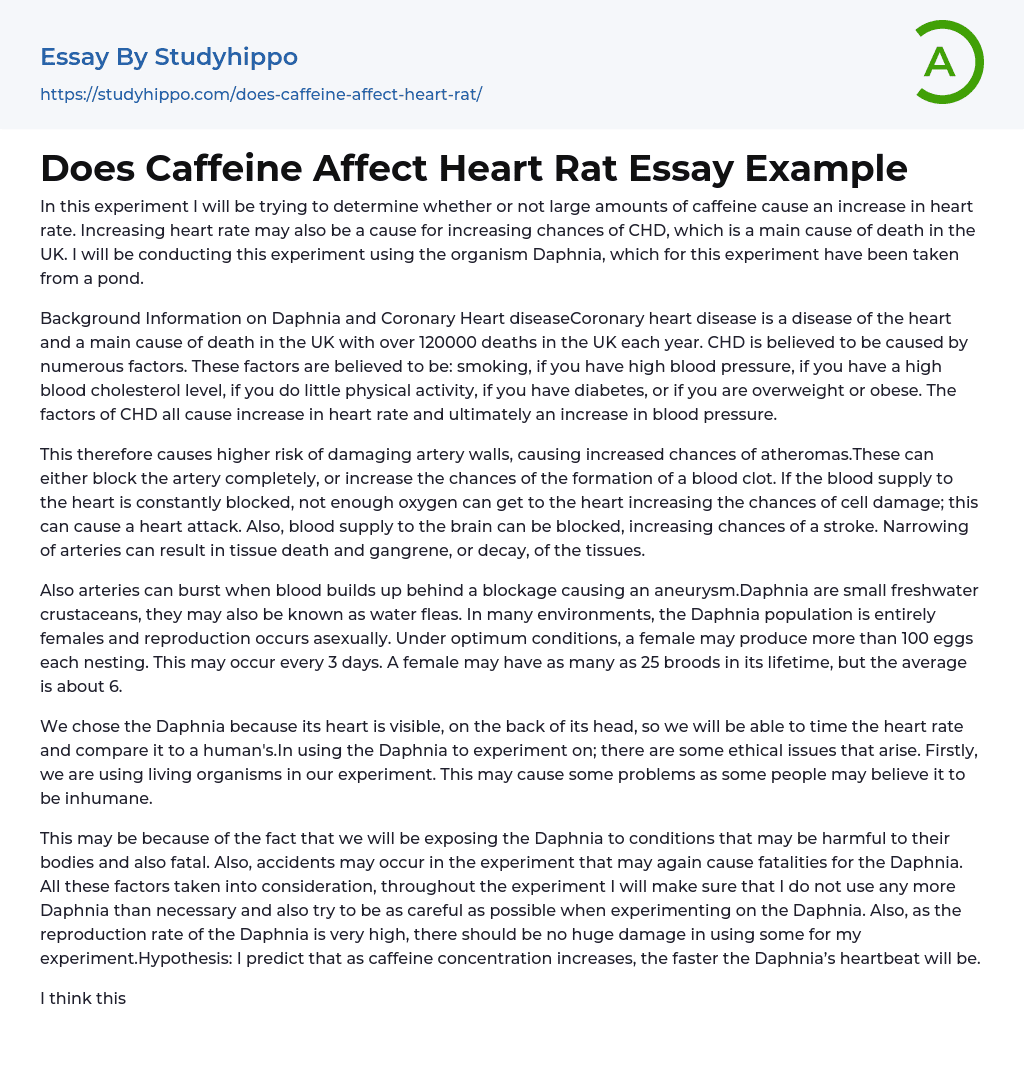In this experiment I will be trying to determine whether or not large amounts of caffeine cause an increase in heart rate. Increasing heart rate may also be a cause for increasing chances of CHD, which is a main cause of death in the UK. I will be conducting this experiment using the organism Daphnia, which for this experiment have been taken from a pond.
Background Information on Daphnia and Coronary Heart diseaseCoronary heart disease is a disease of the heart and a main cause of death in the UK with over 120000 deaths in the UK each year. CHD is believed to be caused by numerous factors. These factors are believed to be: smoking, if you have high blood pressure, if you have a high blood cholesterol level, if you do little physical activity, if you have diabetes, or if you are overweigh
...t or obese. The factors of CHD all cause increase in heart rate and ultimately an increase in blood pressure.
This therefore causes higher risk of damaging artery walls, causing increased chances of atheromas.These can either block the artery completely, or increase the chances of the formation of a blood clot. If the blood supply to the heart is constantly blocked, not enough oxygen can get to the heart increasing the chances of cell damage; this can cause a heart attack. Also, blood supply to the brain can be blocked, increasing chances of a stroke. Narrowing of arteries can result in tissue death and gangrene, or decay, of the tissues.
Also arteries can burst when blood builds up behind a blockage causing an aneurysm.Daphnia are small freshwater crustaceans, they may also be known
as water fleas. In many environments, the Daphnia population is entirely females and reproduction occurs asexually. Under optimum conditions, a female may produce more than 100 eggs each nesting. This may occur every 3 days. A female may have as many as 25 broods in its lifetime, but the average is about 6.
We chose the Daphnia because its heart is visible, on the back of its head, so we will be able to time the heart rate and compare it to a human's.In using the Daphnia to experiment on; there are some ethical issues that arise. Firstly, we are using living organisms in our experiment. This may cause some problems as some people may believe it to be inhumane.
This may be because of the fact that we will be exposing the Daphnia to conditions that may be harmful to their bodies and also fatal. Also, accidents may occur in the experiment that may again cause fatalities for the Daphnia. All these factors taken into consideration, throughout the experiment I will make sure that I do not use any more Daphnia than necessary and also try to be as careful as possible when experimenting on the Daphnia. Also, as the reproduction rate of the Daphnia is very high, there should be no huge damage in using some for my experiment.Hypothesis: I predict that as caffeine concentration increases, the faster the Daphnia’s heartbeat will be.
I think this because caffeine has already been proven as a stimulant for humans keeping you awake and making you more alert.
- Artery essays
- Heart Disease essays
- Anorexia essays
- Breakfast essays
- Caffeine essays
- Chewing gum essays
- Child Development essays
- Chocolate essays
- Diet essays
- Dieting essays
- Eating essays
- Eating Habits essays
- Energy Drink essays
- Food essays
- Genetically Modified Food essays
- Genetically Modified Organisms essays
- Junk Food essays
- Metabolism essays
- Milk essays
- vegetarian essays
- Vitamin essays
- Weight Loss essays
- Action Potential essays
- Blood essays
- Body essays
- Brain essays
- Childbirth essays
- Eye essays
- Glucose essays
- Heart essays
- Human Physiology essays
- Immune System essays
- Kidney essays
- Muscle essays
- Nervous System essays
- Neuron essays
- Poison essays
- Puberty essays
- Sense essays
- Skeleton essays
- Skin essays
- Apoptosis essays
- Asthma essays
- Black Death essays
- Breast Cancer essays
- Cholesterol essays
- Chronic essays
- Chronic Pain essays
- Death essays
- Diabetes essays




